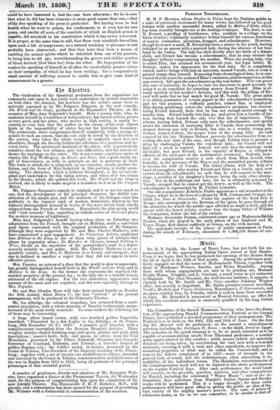tr4e 4tatrfs.
The vindication of the theatrical profession from the aspersions too commonly cast upon it, has lately been undertaken by several dramatists on both sides the channel, but nowhere has the artist's cause been so seriously espoused as by Mr. Palgrave Simpson, in the new comedy, The World and the Stage, produced at -the Haymarket Theatre, on the occasion of Miss Amy Sedgwick's benefit. Here a young lady, who, to maintain herself in a condition of independence, has turned actress, proves so very good, and her sister, who moves in high society, is nearly be- coming so very bad, that the author in the excess of his zeal, almost hints at the impossibility of virtue beyond the histrionic boundary. The aristocratic sister compromises herself completely with a young ex- quisite to such an extent, that she can only be saved by the devotion of the actress, who takes the whole weight of suspicion upon her own shoulders, though she thereby forfeits the affections of a generous and de- voted lover. The aristocratic husband of the sister, who is particularly sensitive about the low alliance, gets into difficulties, and the actress re- deems the mortgage on his estate. She is not a mere capricious sprite of charity like Peg Woffington, in Masks and Faces, but a good steady an- gel of benevolence, as lofty in principle as she is generous in deed. The trials to which she is subjected, on one occasion, nearly produce de- lirium, and the force of Miss Sedgwick in this position, is really aston- ishing. The character, which is arduous throughout, is the second ori- ginal part undertaken by this rising actress, and when after her return to the theatre, which she quitted this week, The World and the Stage is revived, she is likely to make as great a sensation in it as in The Unequal Match.
Mr. Palgrave Simpson's comedy is original, and it is not too much to say, that the development of his principal character, the skilful con- struction of his simple plot, and the neatness of his dialogue raise him suddenly to the topmost rank of modern dramatists, whereas he has hitherto distinguished himself in works of the more trivial kind, chiefly adapted from the French or German. Henceforth the play-going world will "look towards" him, expecting an infinite series of three-act plays, the modern measure of legitimacy.
Miss Amy Sedgwick's benefit having taken place on Saturday, two adaptations from the French, brought out on Monday, made a somewhat poor figure contrasted with the original production of Mr Simpson, although they were supported by Mr. and Mrs. Charles Mathews, who have commenced a new engagement. La Vieomtesse Lalotte, anglicised into Milliner to the King, is one of those wiry pieces of intrigue that please by ingenuity alone; En Munches de Chemise, termed Nothing to Wear, dwells on the mysteries of the pawnbroker's craft to a degree scarcely suitable to ears polite. Still, Mr. Charles Mathews is so ex- quisitely volatile, and Mrs. C. Mathews is so hearty and energetic, that one is inclined to smother a regret that they did not appear in more effective pieces.
Mrs. Poynter, an actress of a class that the world is slow to appreciate, has greatly distinguished herself both in the World and the Stage and in Milliner to the King. In the former she represents the starched old- maidish propriety of the present day ; in the lady she is a terrible female aristocrat of the old regime. For the two characters, appearance and manner of the same sort are required, and this sort especially belongs to Mrs. Poynter.
Mr. and Mrs. Charles Kean will take their annual benefit on Monday the 28th instant, when Henry V., the last "revival" of the present management, will be produced at the Princess's Theatre.
Mr. Ira Aldridge, the coloured tragedian, has returned from a conti- nental expedition, with a whole museum of Russian testimonials, manu- factured of the most costly materials. To some readers the following list of them may be interesting.
A large silver laurel crown, with two hundred golden Imperials, inscribed, "Presented by a few Ladies to Ira Aldridge, at St. Peters- burg, 20th December (0. S.) 1858." A massive gold bracelet, with a complimentary inscription from the Russian Dramatic Artistes. Three weighty antique-shaped drinking-cups and spoon, platina and gold, with inscriptions ; massive knife, fork, and spoon, in silver, from the Ural Mountains, presented by the Prince Suwaroff, Governor and General- Governor of Courland, Esthonia, and Livonia; a bracelet formed of golden Russian coin ; the Jubilee medal, in bronze, presented by the Count de Tolotoz, Vice-President of the Imperial Academy of St. Peters- burg; together with a set of twenty-one medallions in relieve, invented and executed by the Count de Tolotoz, commemorative and illustrative of the war in Russia from 1812 to 1815, being all portraits of the principal personages of that eventful period.


































 Previous page
Previous page